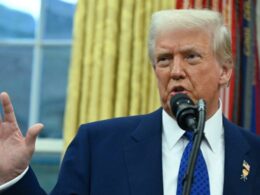Unlock the Editor’s Digest for free
Roula Khalaf, Editor of the FT, selects her favourite stories in this weekly newsletter.
Target sales tumbled more than expected in the first quarter as customers vented their anger over the retailer’s retreat from diversity initiatives and fears over the US economy mounted.
Same-store sales dropped by 3.8 per cent year on year in the quarter as fewer shoppers visited — and spent less — at Target’s nearly 2,000 locations, the company reported. The fall was the first in a year and surpassed expectations for a 1.7 per cent slide, according to Visible Alpha.
Brian Cornell, Target’s chief executive, pointed to poor consumer sentiment, worries over US tariffs and a sustained backlash against its widely publicised rollback of diversity, equity and inclusion policies.
The Minneapolis-based company on Wednesday also lowered sales and profit forecasts for the year, established an “enterprise acceleration office” to improve operations and disclosed the departure of two senior executives less than a year after they took their roles.
“I want to be clear that we’re not satisfied with these results,” Cornell said.
Target, once a Wall Street darling known as the home of affordable style, has struggled to revive sales that have faltered since the pandemic. Its shares were down 28 per cent this year to Tuesday, compared with a 1 per cent rise in the broader US stock market.
The weakness at Target contrasts with some competitors. Walmart, the world’s largest retailer, last week reported that US like-for-like sales increased by 4.5 per cent in the quarter, thanks in part to its grocery business.
The US retail sector has been shaken by President Donald Trump’s tariffs on imports from China and other countries. Walmart last week drew Trump’s scorn after saying it would be forced to raise prices to cover the cost of the levies.
Target relies on China for 30 per cent of its in-house brands. Executives said they would seek to soften the cost of tariffs, such as increasing the number of countries where its merchandise was produced and concentrating on cheaper items in its assortment. Raising prices was “the very last resort”, Cornell said.
Executives acknowledged financial damage from boycotts aiming to punish the retailer’s retreat from DEI policies in January. While Target was one among many companies to scale back diversity commitments, the move angered customers who had admired its long-standing support for social causes. Cornell cited the “reaction to the updates we shared on belonging in January”, referring to the group’s new strategy on inclusion.
Black church leaders are planning protests outside Target stores on May 25, the date when George Floyd was killed by Minneapolis police five years ago, according to USA Today.
In a note to employees in early May, Cornell said “it’s been a tough few months” and acknowledged that “silence from us has created uncertainty”.
To lure customers back, Target has been refreshing its inventory and in-store displays, including the launch of more than 10,000 new items this summer and free giveaway events during Saturdays in June.
The enterprise acceleration office would spur “speed and agility” at the company, Target said, and would be headed by chief operating officer Michael Fiddelke.
Target also announced that Christina Hennington, chief strategy and growth officer, and Amy Tu, chief legal and compliance officer, would leave the company. Hennington and Tu assumed their roles in July and August 2024, respectively.
Target on Wednesday forecast a “low-single digit decline in sales” for this year, scrapping earlier guidance for a 1 per cent rise. It also cut its guidance for adjusted earnings per share.
Net sales in the first quarter were $23.8bn, down 2.8 per cent year on year and below estimates of $24.3bn.
Net income rose 10 per cent to $1bn, but the figure was flattered by nearly $600mn in one-time pre-tax gains from a legal settlement. Excluding the settlement, adjusted earnings per share declined by 35.9 per cent.
Source link









